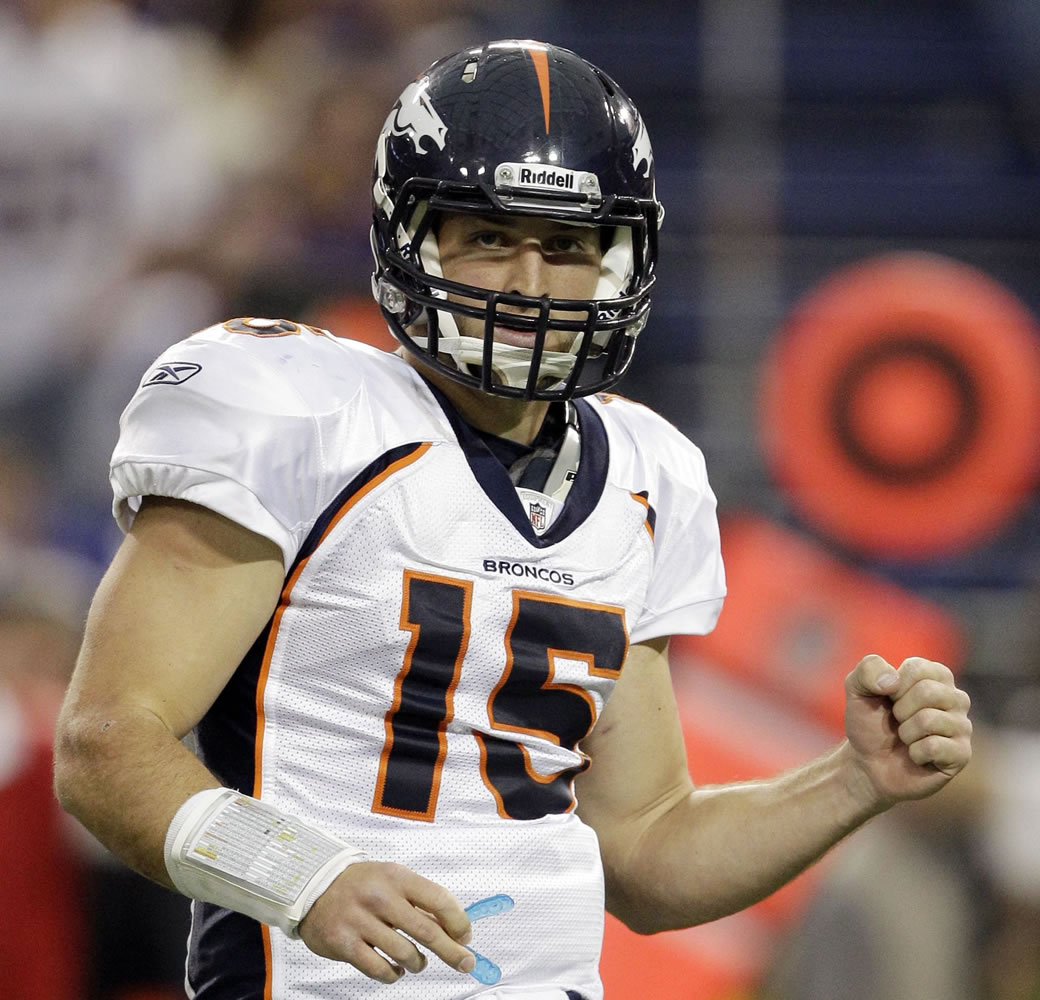OK, OK, we probably read too much into this.
We see a quarterback who couldn’t hit the broad side of a barn with a football take over a 1-4 team and lead it to seven wins in eight games, and we search for answers. Goodness knows, everything needs to have a logical explanation, doesn’t it?
So we subscribe some nebulous concept such as “intangibles” to describe how Tim Tebow and the Broncos keep winning week after week, and we run this theory past Jason Scukanec, the sage of Portland sports-talk hosts.
“I think we make too much of that,” Scukanec said. “We want to make it out that Denver is winning because Tim Tebow is inspiring people. But people in the NFL are playing because they want a paycheck; they want to provide for their family.
“We want to romanticize it, and that’s just not the case. It’s never as easy or as simple as we want to make it. It’s not as hokey or as corny as we want to make it.”
Therein lies the problem with any assessment of Tebow’s performance, which, as measured by ESPN chatter or Sports Illustrated covers, is a national obsession.
Hokey and corny are Manna to sportswriters — and to fans. So we eat up the Tebow story as if we’ve been wandering in the desert, and we search for a way to define the thin line between winning and losing.
We search for the difference between Michael Jordan and LeBron James. We wonder why Tom Brady has three times as many Super Bowl rings as Peyton Manning. And we never really find the answers because group dynamics are far too complex to be understood if you aren’t a member of that group.
Because of that, Tebow — along with Brady — probably provided somebody somewhere with fodder for a doctoral thesis last Sunday. It’s a sociology paper, undoubtedly, something about group dynamics and team functionality and the mercurial aspect of winning.
After leading the Broncos to a rather stunning comeback against the Bears, Tebow proceeded to praise everybody in the organization, even calling the place-kicker a “great guy” and a “great player” and a “great person,” and lauding a receiver for being a good blocker.
We’re guessing that Randy Moss’s quarterbacks never singled him out for blocking well.
Brady, meanwhile, got into a sideline argument with offensive coordinator Bill O’Brien during the Patriots’ victory over the Redskins, and afterward said: “I threw a pretty bad interception, so he wasn’t happy about it. There was probably a long line of coaches and players that were pretty (upset) at me after that, but Billy got to me first. He let me have it; I deserved it.”
The comments, at least on the surface, were self-effacing and selfless, fitting into what author Bill Simmons calls “The Secret” as he describes what makes a winner. The cynical among us might question the sincerity or the impact of the quotes from Tebow and Brady, but a good argument can be made that selflessness is the key to making a championship team.
And there’s no faking it. How often have you seen an athlete have a great game and then say, “It doesn’t matter because we didn’t win”? How often have you believed it?
Tebow and Brady and every other high-profile athlete are masters of saying the right thing in front of the cameras, but if their actions in the locker room or on the practice field contradict those statements, there’s no way they can fool their teammates.
“That’s a very real component of sports, but it’s a piece,” Scukanec said. “You want to know what the biggest piece is — ability.”
That creates a dichotomy. The public is prone to assigning success in pressure situations to some sort of character trait, to thinking that players who come through in the clutch have superior intestinal fortitude.
But the great ones, the greatest ones, are those who project that fortitude onto those around them. Jordan, by all accounts, was a bear of a teammate, but it’s probably not a coincidence that Steve Kerr and John Paxson — a pair of journeymen players — made championship-winning shots to provide Jordan with two of his titles.
So as we search for the words to define what makes a champion and what makes a good teammate, we come back to something that Bill Russell — the greatest winner in American team sports — said a few years ago during an appearance in Vancouver.
“I was thought of as an unselfish player,” Russell said. “That was absolutely, unequivocally untrue. I was completely self-absorbed. But I played a team game. If I can take my skills, my talent, my attitude, even my arrogance, and make my team the best there is, then my ego is satisfied.”
Not all athletes find ego gratification in the success of their teams. And that, in the end, is what makes all the difference.
Greg Jayne is Sports editor of The Columbian. He can be reached at 360-735-4531, or by e-mail at greg.jayne@columbian.com. To “Like” him on Facebook, search for “Greg Jayne – The Columbian”



